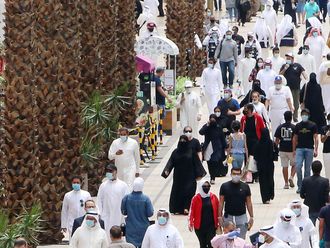
Cairo: The long-held suspicion among Egyptians that President Hosni Mubarak is grooming his son Jamal to replace him one day is crystallising into a widespread belief. There are now signs that "one day" may be as close as next year.
As President Mubarak hosted the next round of peace talks in Sharm Al Shaikh on Tuesday, some say he's sending a message to both the Americans and the Israelis that Jamal is the safest choice to preserve Egypt's peace with Israel, which is deeply unpopular among the Egyptian public, and its role in shepherding the negotiations.
In recent weeks a group has been plastering posters in low-income Cairo neighbourhoods with the slogan "Jamal Mubarak: dream of the poor."
With a presidential election scheduled for next year and concerns about the health of the 82-year-old leader, the posters are taken by many as the first salvo in an election campaign for Jamal.
Jamal also accompanied his father to Washington for the launch of renewed Israeli-Palestinian peace talks earlier this month. That led to a flurry of speculation that the elder Mubarak was seeking US President Barack Obama's blessing for hereditary succession in a nation that receives more than $1 billion (Dh 3.67 billion) in US aid each year.
Both Mubaraks have denied a succession plan. But the talk grows louder each year. President Mubarak has not named a vice-president since he took power nearly 30 years ago, creating confusion over what would happen if he dies in office. Many Egyptians are deeply opposed to Jamal inheriting power, and say that would push Egypt farther away from democracy.
"There are many signs that the regime is very much insisting that Jamal Mubarak will take over," says Hassan Nafa'a, a political science professor at Cairo University and a vocal opponent of hereditary succession.
Since 2000 Jamal has climbed through the ranks of the ruling National Democratic Party (NDP) and now heads the powerful Policy Committee. Recent constitutional amendments were passed that allow for "competitive" presidential elections, but give the ruling party's candidate a clear advantage.
The recent moves, says Nafa'a, "are a step for marketing him. ... they are preparing the theatre" for the transition. He does not think Hosni Mubarak has yet made the final decision on whether to run in next year's elections, however.
One sign that seems fairly concrete in a nation where conspiracy theories abound is the fact that the posters endorsing a Jamal presidency have not been torn down by the regime.
When similar posters appeared recently urging Egypt's intelligence chief Omar Sulaiman to run for president, they were quickly removed by state security.












